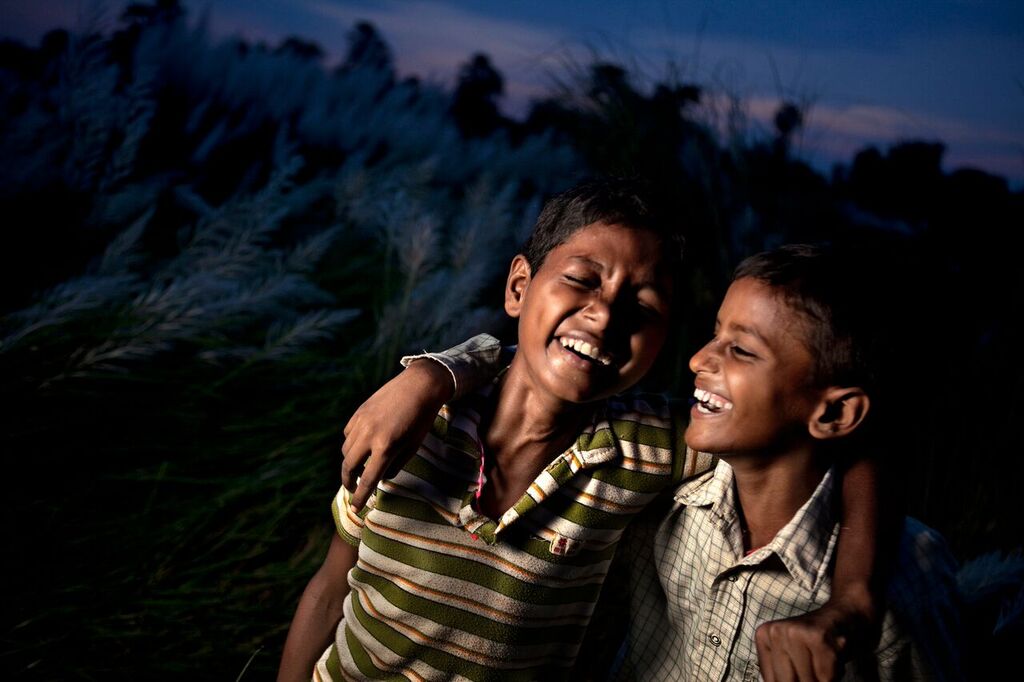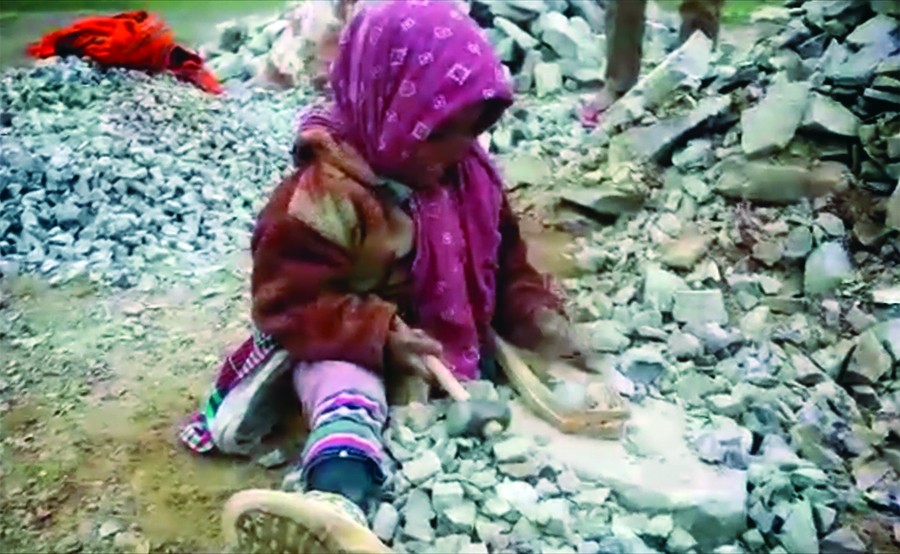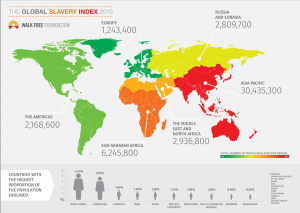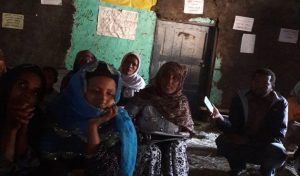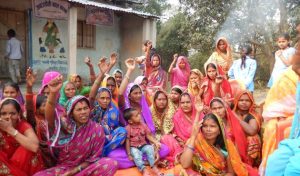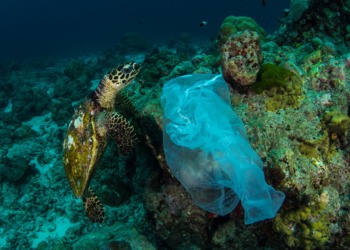Maya is six years old. She spends her days sitting in a stone quarry in Bihar, India, using a hammer to break stones into smaller pieces. The smaller stones will be used for building roads. She has never been to school, and probably never will. The work is physically draining for her small physique, and every day she inhales unhealthy amounts of dust from the stone crushing. Without outside intervention she will end up doing this for many more years, and will likely be married off soon after hitting puberty, with all the risks of early childbirth that entails.
In the photo: We have 45.8M modern day slaves. Photo credit: From the Freedom Fund short movie LINK
How did she end up in this modern form of slavery?
The most common scenario for millions trapped in bondage in South Asia is that her father took a small loan in return for agreeing to work in the quarry. He had a quota of rock to crush each week—but couldn’t make the target. In the meantime, the debt grew, because it came with a punitive interest rate and his subsistence pay was barely enough to provide food for his family, let alone pay off the loan. And every time someone in the family became ill, the father had to borrow more money for healthcare, increasing the amount he owed. He couldn’t leave the quarry, because the overseer employs thugs to beat up anyone who tries to flee. Local officials ignore the abuses, at best. At worst, they are bribed to turn a blind eye. To pay off the ever-increasing debt the overseer tells the father that he had to enlist his wife and children—which is how Maya and countless other children like her come to be performing back-breaking work instead of going to school.
This is the reality of slavery today. It goes by many names—human trafficking, forced labor, sex trafficking, bonded labor … etcetera—but the essence is the same: the control of an individual through violence or other forms of coercion, in order to force them to work or exploit them for sex.
A GLOBAL PROBLEM

PHOTO CREDIT: Walk Free Foundation
Slavery still thrives around the world. Although enslavement is a crime under international law, and prohibited in every country, recent estimates put the number of slaves alive today at between 20, 900 000 and 45, 800 000. 5, 500 000 are children.
Wherever you are, there are slaves—because despite the global prohibition on slavery people are exploited in every country. Modern slaves can be found in ISIS-run slave markets in Syria.
In the Congo: men, women and children are compelled by militias to mine minerals for our smartphones. Burmese migrants are trapped on Thai fishing boats and forced to fish seafood that ends up on our supermarket shelves. In West Africa, enslaved children pick cocoa for our chocolate. Workers, in bondage in South Asia, are used to make our dirt-cheap t-shirts.
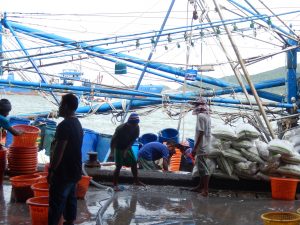 PHOTO CREDIT: Audrey Guichon / Freedom Fund
PHOTO CREDIT: Audrey Guichon / Freedom Fund
No state can effectively tackle modern slavery on its own. As Pope Francis has noted, slavery is a; “global phenomenon which exceeds the competence of any one community or country.”
TACKLING SLAVERY TO PROMOTE DEVELOPMENT
Slavery thrives because it can be hugely profitable to its perpetrators. The International labor Organization estimates the profits from slavery at $150, 000 000 000 annually. But while perpetrators profit, communities and states bear a huge cost, in addition to that imposed directly on the victims.
Slavery shackles development. It drives down local wages and productivity, suppresses tax revenues, and removes valuable human capital from the economy. As a result, we all bear the costs of slavery.
This also means, however, that fighting slavery is smart development policy. World leaders recognized this when they adopted a new target in Sustainable Development Goal (SDG) 8.7 (Take immediate and effective measures to eradicate forced labor) at the United Nations—to end modern slavery and forced labor by 2030.
Related article: “THE ROCKY ROAD TO HUMAN RIGHTS: THE SDGS ARE ONLY PART OF THE SOLUTION”
How is that going to happen?
The good news is that we already know quite a bit about the steps that need to be taken to tackle this evil.
Slavery is a product of vulnerability arising from: social exclusion, income shocks, illiteracy, low educational levels, state instability, conflict, high corruption levels, or insecure immigration status.
 PHOTO CREDIT: Audrey Guichon / Freedom Fund
PHOTO CREDIT: Audrey Guichon / Freedom Fund
We can reduce vulnerability to slavery by: improving access to education, credit, food, health care, land, wage regulation, women’s rights, safe migration and recruitment, rehabilitation services and through strengthened law enforcement.
The challenge now is to systematically tackle the drivers of slavery. New sources of funding for anti-slavery efforts, especially from the private sector, can help. But research makes clear that private action and public regulation have the biggest impact in this field when they work together.
The UN has provided leadership in combating slavery, forced labor and human trafficking over the last century. International criminal tribunals are also helping explain how the norms against slavery apply in contemporary conditions. But these international efforts are fragmented and poorly coordinated, weakening their effectiveness.
Today the UN system provides limited political leadership to sustain anti-slavery efforts in the face of vested and corrupt interests. Most interventions act at a local level and are not connected, failing to address global supply-chain issues. And interventions are haphazardly funded and often not driven by global data sharing and analysis. International anti-slavery efforts do not effectively bring together the different levers of development policy, on trade regulation, on peace and security and in international criminal justice, and through engagement with business.
A GLOBAL PARTNERSHIP TO END SLAVERY
 PHOTO CREDIT: Ginny Baumann/Freedom Fund
PHOTO CREDIT: Ginny Baumann/Freedom Fund
Slavery will only end if we effectively use all the levers available to us. To do this we need to establish a: global partnership of states and UN organizations and representatives of business, workers and frontline organizations—all key actors in the fight against this crime. The purpose of the partnership would be to mobilize this constituency to achieve ambitious shared goals, foremost among them being the eradication of slavery by 2030, and measurement of progress towards that goal in the interim.
The International labor Organization has proposed establishing such a partnership—to be called Alliance 8.7: (Joining forces globally to end child labor, forced labor, modern slavery and human trafficking)—and which would have exactly these goals. The Alliance is beginning to attract interest and support from member states, UN agencies and other groups, and deserves support.
This Alliance partnership should foster innovation through pooled investment in data, research, development, and dissemination. It should measure how much progress is being made (or not) to reduce slavery and forced labor.
It should help coordinate efforts to protect global supply chains against slavery by creating roadmaps to help states and global brands and retailers undertake reforms.
It could lower the transaction costs for communities, countries and companies looking for anti-slavery assistance. And it should encourage support for local organizations working on the frontlines of the fight against slavery, as key drivers of the systems change required to tackle this extreme exploitation.
A successful partnership will also require leadership—especially from governments, the UN and regional organizations. We need to make slavery a focus of integrated multilateral efforts, if we are going to end it by 2030.
The UN secretary-general should appoint a time-bound Special Coordinator on Modern Slavery, to work across the different silos within the UN, and with member states, to help build the Alliance over the next two years. States should make ending modern slavery a focus at the UN, taking action within the UN General Assembly and Economic and Social Council.
Bringing together all of these levers will drive real progress against the ambitious goal of eradicating slavery by 2030.
It will ensure that millions of girls and boys will escape the fate of Maya, and be able to live free from the extreme exploitation and violence they would otherwise endure.
That’s what sustainable development is really about.
Recommended reading: “A SHORT HISTORY OF THE SDGS”


